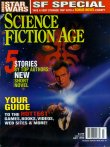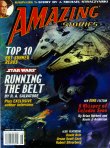Locus short fiction reviewer (and Locus Online editor) Mark R. Kelly counted almost 1900 works of short fiction published in 1998, almost 500 in the half-dozen principal magazines of the field: Asimov's, Analog, F&SF, Interzone, Science Fiction Age, and Realms of Fantasy. Which stories should you read, if you only have time for a few? This page will post brief reviews of notable stories in current magazines -- and we'll try hard to get reviews here while the issues are still on the stands. Longer reviews of these and many other stories appear in Locus Magazine.
|
|
 Asimov's Science Fiction July 1999
Asimov's Science Fiction July 1999
Michael Swanwick, ''Scherzo with Tyrannosaur''
At a benefit dinner in a Cretaceous-era research outpost, guests listen to Scarlatti while real dinosaurs cavort outside the windows. The outpost manager saves a nervous paleontologist docent from a flirtatious dinner guest, but in doing so creates a potential time travel paradox that could jeopardize humanity's license to travel in time. Like several other recent Swanwick stories, this one recasts classic SF themes in an expertly literary, shiny new edition.
Robert Reed, ''Baby's Fire''
This novella is the latest in a series of stories, beginning with ''Sister Alice'' (1993) and continuing with ''Brother Perfect'' and ''Mother Death'', about a galactic civilization dominated by powerful Families. An attempt by the Chamberlain Family to create a pocket universe for further human expansion has failed, destroying the Earth. Now Ord, little brother of Alice, races at relativistic speeds for the center of the galaxy, pursued both by a wrathful member of a rival family and an apparently disinterested but curious member of a neutral family. Reed's prose is dense yet poetic; at its best it recalls the colorful precision of Gregory Benford's work, and like it, this story is rigorous hard SF.
§
 Science Fiction Age July 1999
Science Fiction Age July 1999
Wil McCarthy, ''Once Upon a Matter Crushed''
Eccentric hard SF about Bruno de Towaji, wealthy inventor of the collapsiter grid (an interplanetary teleportation system), called away from his private planetoid in the Oort cloud where he's been experimenting on the nature of ''collapsium''. He's recruited by the Queen of All Things to help save the unstable ring of collapsium that encircles the sun (built for communications, since the speed of light is higher in collapsium than in vacuum). Bruno is feted at a dinner party held on a mountaintop on Venus, where he mixes uncomfortably with glitterati and fellow scientists, until inspiration strikes. The leisurely party scene contrasts with technical infodumps about the nature of collapsium that occasionally too closely resemble Star Trek style doubletalk, though presumably McCarthy, who has a forthcoming novel called Collapsium, knows what he's talking about.
Don Webb, ''Faith''
A man suffers a bicycle accident and wakes up inside the Hazel Motes Memorial Church of Jesus Christ Without Christ, without any memory of who he is. Meanwhile his frantic wife endures the the trauma and then humiliation of being apparently deserted by her husband -- until fate brings the two together again. A short, sly story with a surprising and clever conclusion.
§
 Amazing Stories Summer 1999
Amazing Stories Summer 1999
Brian Herbert and Kevin J. Anderson, ''A Whisper of Caladan Seas''
A new story set in the universe of Frank Herbert's classic novel Dune (to which these authors have a forthcoming sequel novel). Atreides soldiers trapped in a cave on Arrakis by a Harkonnen attack seek escape in the hypnotic storytelling of their Master Jongleur, who recalls for them the wet oceans of their home world. The story resolves effectively, but as pure fantasy, oddly for a story set in one of the most elaborate SF settings ever created.
Kage Baker, ''The Fourth Branch''
At a 6th century monastery suspicious of its Druidic past, a visitor, Lewis, gains lodging in exchange for his wealth of songs and wonder-tales. The visitor is a cyborg, we learn, and the story is part of Baker's ongoing series about future time travlers mining the past. The monastery is raided by the local sidhe, or fairies, who Baker identifies with, of all things, UFO aliens. Revelations about these creatures and the evolution of humanity may complicate the overall scheme of Baker's series, but on its own terms the story is absorbing, especially in the way it depicts future technology from the perspective of a historical character who can't begin to understand what he sees.
Orson Scott Card, ''Heal Thyself''
A boy is taken by his parents to visit the North American Wild Animal Park, where they view a preserve of Neanderthals from inside a biosealed bus. The Neanderthal exist because of a discovery about human disease that revealed an uncomfortable truth about human evolution. The story is exposition-heavy, but its premise is ingenious and provocative -- as if invented to substantiate the idea that, for humans at least, death really is a gift from God.
Robert Silverberg, ''Travelers''
In a decadent far future, four friends flit from one world to the next by means of ''relay-sweeps'' that carry them across the light-years without the need of space ships. Their powers are godlike, but on a dangerous and dreary planet one of them suffers an accident beyond their powers to control. The lesson is pat but the story has an exotic, old-fashioned appeal.
(Wed 14 July 1999)


 Asimov's Science Fiction July 1999
Asimov's Science Fiction July 1999
 Science Fiction Age July 1999
Science Fiction Age July 1999
 Amazing Stories Summer 1999
Amazing Stories Summer 1999